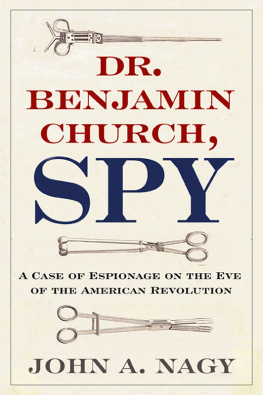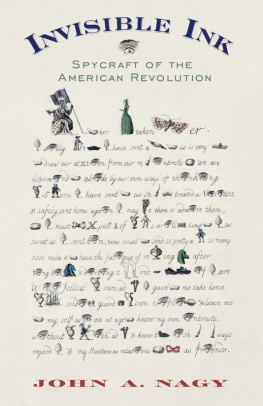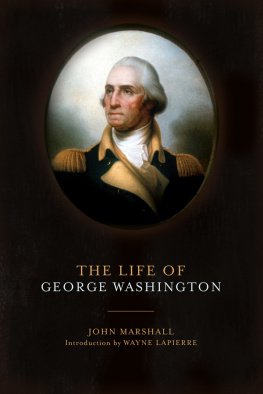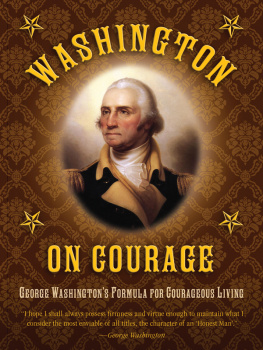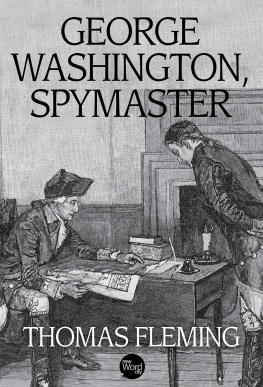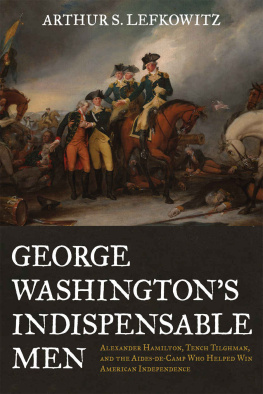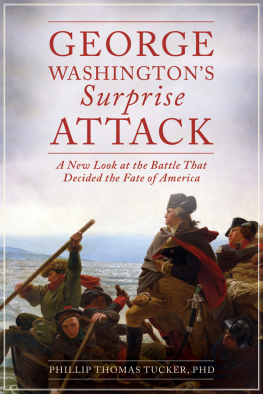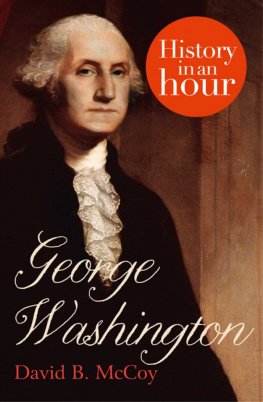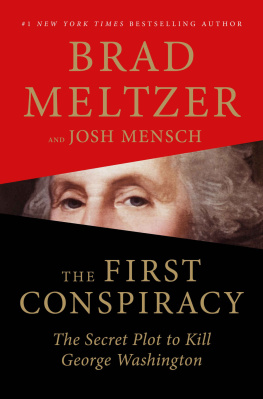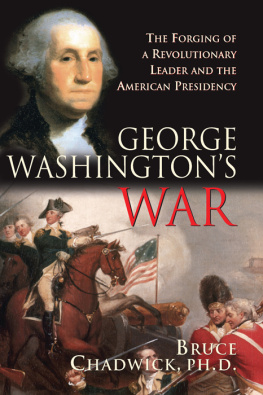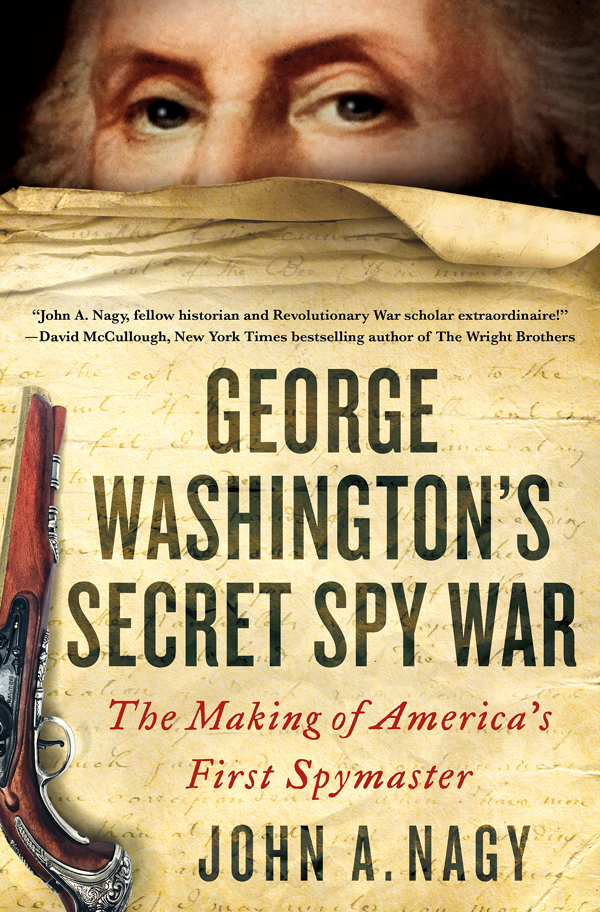Contents
Guide

The author and publisher have provided this e-book to you for your personal use only. You may not make this e-book publicly available in any way. Copyright infringement is against the law. If you believe the copy of this e-book you are reading infringes on the authors copyright, please notify the publisher at: us.macmillanusa.com/piracy.
To Ida Marie Nagy, my wife, for all these years of enormous amounts of patience and encouragement to write the books
There is nothing more necessary than good intelligence to frustrate a designing enemy, and nothing that requires greater pains to obtain.
GEORGE WASHINGTON TO ROBERT HUNTER MORRIS, JANUARY 1, 1756.
George Washington has been dead for over two hundred years and one would think that nothing new could be written about him, that everything has been discovered and observed under the microscope, but I have found that there is one key aspect of his extraordinary life and career that to this day has remained little explored. He was Americas first spymaster. And his skill as a spymaster provided for the opportunity to win the American Revolution and independence from Great Britain.
Washington took a disorderly, hygiene-deficient, ill-equipped, ill-behaved rabble that could not march or fire in unison and defeated the best-disciplined, best-equipped, and best-trained army of its day. When he resigned as commander in chief of the Continental Army, King George III of England called him the greatest character of his age. Unlike some other founding fathers, he is neither forgotten nor has his impact dimmed despite the passage of time. Every year millions of people from around the world make a pilgrimage to his Mount Vernon home to learn more about him. The demand for information about this multifaceted man has recently spawned a new major library, the Fred W. Smith National Library for the Study of George Washington, which opened in 2013 in Mount Vernon, Virginia. The library raised $106 million from private sources for the study of Washingtons life, achievements, and character. The quest for knowledge of the man burns brighter today than ever.
George Washington was a Virginia farmer who became Americas first and the eighteenth centurys greatest spymaster. This will be the first book to focus on this vital component of his military leadership. To the extent that his spycraft is written about in previous books, it is most often about the usual topics of Nathan Hale, the inept spy; Benedict Arnold, the traitor; and the Culper Spy Ring, Washingtons fourth and overcredited spy ring. There are a number of books on these subjects that are available.
Over the last twenty-four years I have discovered hundreds of spies who went behind enemy lines to gather intelligence during the American Revolution and returned to the American side. Previously I have published the names of 160 such spies, many of whom were completely unknown. There are some spies in this book that are now revealed for the first time.
George Washington did not come completely unskilled in this extremely important facet of warfare to the American Revolution; that is, he was not totally ignorant of spy craft as some would have you believe. His first steps in the field of espionage began as a young man during the French and Indian War.
During that war, despite his young age he quickly realized that the French were encouraging his Indian allies to turn away from him and become their allies. He discovered that the French were sending spies to find out all they could about him and the strength and disposition of his Virginia forces. He took great delight in sending the French spies back to their handlers with false information. He also recognized that he needed intelligence of what the slippery French were planning so that he could prepare for what was to come. He needed his own spies to gather the intelligence he wanted and required. He recruited spies to go into the French fort at the Forks of the Ohio to bring back the condition of the fort and the status of its men. He even did some espionage himself at Fort Le Boeuf. He knew he had to be on the lookout for French deceptions. He provided code words so that his spies were not fooled by false messengers claiming to have been sent by him.
Not everything went his way. He signed a document in French, a language he could not read, that said he had assassinated an emissary of France while he was on a peaceful mission to the British. Washington insisted that not only this word but other portions of the capitulation document had been mistranslated. It was a wet document signed in the rain in the Allegheny wilderness. It was a document that set the world on fire and brought on the Seven Years War, known as the French and Indian War in North America.
Although he routinely cautioned his staff on the need for secrecy in conducting secret service activities, not everyone listened. He had spiessuch as George Higdaywho were captured by the British because of the carelessness of their case agent, Benjamin Tallmadge. When Washington received Tallmadges letter of July 3 informing him of the loss of his correspondence in a skirmish, Washington wrote back that the person who was in the most danger was George Higday, who lived on or near the North River not far from the Bowery in New York City. I wish you could endeavor to give him the speediest notice of what has happened. My anxiety on his account is great. If he is really the man he has been represented to be, he will in all probability fall a sacrifice. As Washington had predicted, Higday was arrested on July 13 and placed in the provost, the military jail.
From the provost Higday wrote a desperate letter to General Henry Clinton informing him that about three or four weeks prior he had taken three American officers across the Hudson River to New Jersey.
On going over their discourse was what a fine thing it might be for me to fetch information over for Washington that he would make me rich in so doing accordingly I being left by God and his divine protection to myself [he yielded to the temptation and he went with the American officers to General George Washington] and offered the above proposals but he was afraid to enter [into agreement] but said he would consider on it. And did not countenance me much & had some Congress money & thought to buy a cow on time with itthe money was so bad I could not buy one so I returned home for which reason I suppose he hath sent this letter that now is taken Now I did not think even they would write to me for Washington said my name was in the black book for being a friend to government and would not trust me.
On August 28, 1780, Higday was listed on the British provost report for New York as an inhabitant of the city who was placed in the provost by the commander in chief, General Clinton. It indicated he had spent 507 nights in jail without being charged with a crime. He was an example of what could happen to spies due to American carelessness even if they were only suspected.
In the eighteenth century every general was expected to develop and run his own intelligence-gathering operation. Every lieutenant colonel and colonel with ambition to advance in rank to general needed to study his commanders methods for conducting intelligence gathering if they had not already mastered them. It was on-the-job training. Washington worked during the French and Indian War under British Major General Edward Braddock, commander of all British forces in North America. He would have known Braddocks cipher and how it was used.


